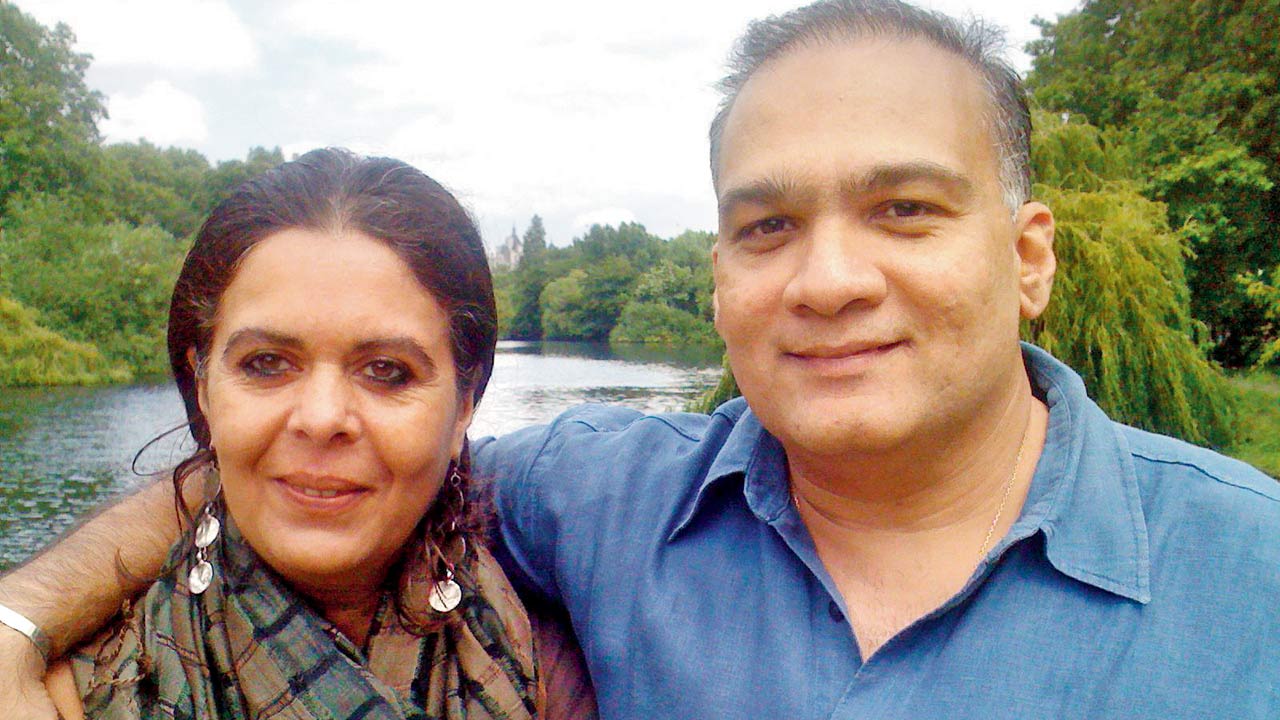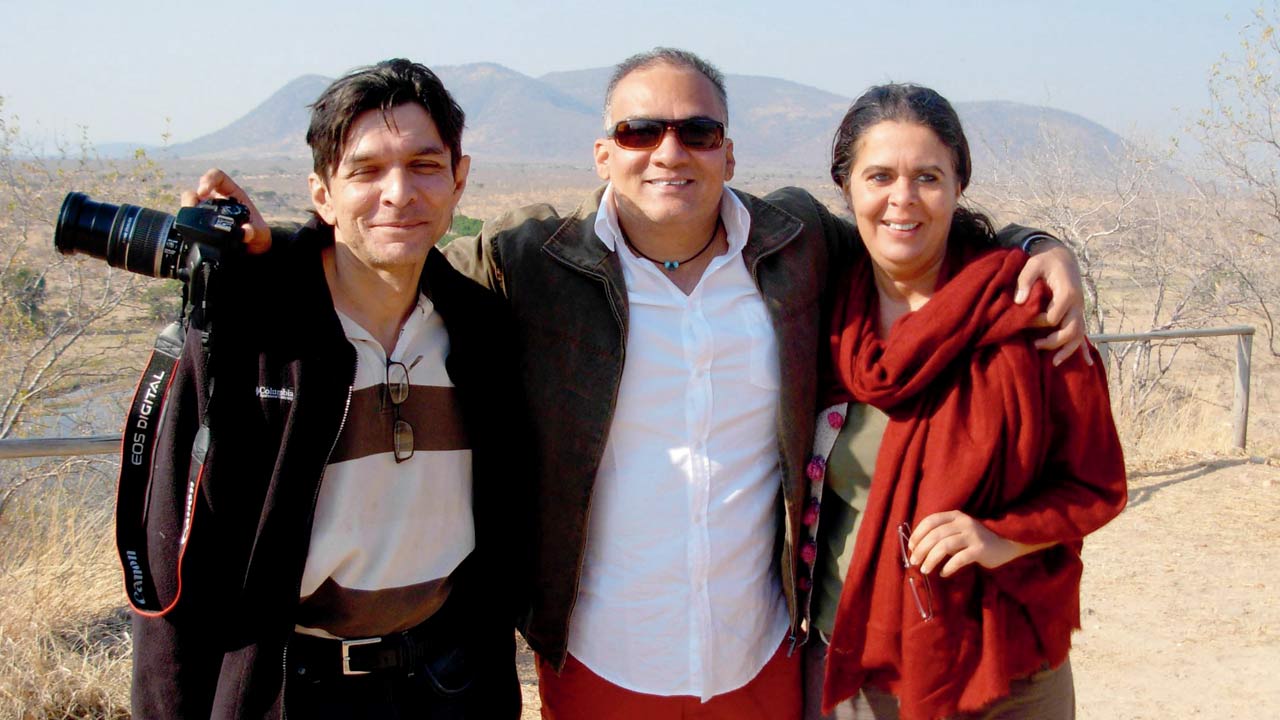Development consultant Criana Connal and media man Rahul daCunha have synced on the same page well over 40 years

Rahul daCunha and Criana Connal revisit an old haunt, Light of Persia cafe on Pedder Road. Pic/Bipin Kokate
 Criana Connal, 57, international development consultant
Criana Connal, 57, international development consultant
ADVERTISEMENT
Rahul daCunha, 59, adman, theatre writer-director
Their worlds couldn’t be more disparate. Yet stay steadfastly bound.
She, a senior development consultant, specialising in education in Africa, South-East Asia and South Asia. Her leading clients are UNICEF, UNESCO, the World Bank and African Development Bank bilaterals.
 In London, 2008
In London, 2008
He, a playwright and director, this paper’s popular columnist, the Amul Man heading the team that drums up four witty-wise taglines a week.
Criana Connal and Rahul daCunha are soul friends, travel companions, each other’s conscience keepers. Agreeing that an honest dynamic makes one’s weaknesses speak wonderfully to the other’s strengths.
Criana Connal (CC): We met in the final years of school in 1979. Though younger, I hung with the rest of his circle—that’s lasted 40+ years. The only non-girlfriend to the group’s boys, I remain touched by my chhoti-behen status.
 Holidaying with friend Samar Gupta in Dar es Salaam, 2009
Holidaying with friend Samar Gupta in Dar es Salaam, 2009
That Cathedral bunch went on to St Xavier’s College, lucky to be taught English Lit by Rahul’s mother Nisha. Guess he and I may have shared an inflated idea of our literary talents! We read rather a lot. At least I did and Nisha urged Rahul to.
My family lived on Pedder Road, his up an opposite lane. My memory of the daCunha home is wooden rooms and staircases leading off—as in an Escher painting—with plenty of art-covered walls and bookshelves.
Rahul daCunha (RDC): I had never known anyone like Criana. It wasn’t just the unusual mixed parentage. Here was a girl totally different from South Bombay chicks. She later moved to Juhu. I thought I had cool parents till I met hers. Feminist, ballsy, yet conventional, her architect mother, Rudra, is Gujarati but very English in attitude. Bill, her father, really loves India.
CC: Well, there was an underlying conservatism, tremendous fights initially about me staying out nights. At 17 and 19, we were into the usual, smoking bidis and reading books from Spinoza to Ayn Rand. Pretentious? Maybe. We’ve become genuinely more political on getting older.
My house would be filled with my sisters’ friends and mine. Neither household was strict. Except, when I visited Rahul’s, we had to keep his room door open. I don’t know why. All we did was practise songs like Shooting Star and Seagull on our guitars.
RDC: My home was comparatively quiet, hers resembled a Jewish clan. Like characters in a Neil Simon play, everyone spoke above the other. They’re massively warm people, such familial joy there. We grew with interestingly mixed influences from three distinct communities. Both our moms, Guju. My dad Sylvester, Goan. Hers, Bill, Scottish.
Graduating around 1984, we visited Ladakh with some of the gang. Most amazing was to greet Cri in her national habitat, very much a part of her—in 1991 when my play Larins Sahib showed at the Edinburgh Fringe Festival. On my first trip to England in 1985, we met at Oxford. From the 2000s, I was in London practically every year, catching up when she was there. Touring Dar es Salaam in 2009, we enjoyed Zanzibar, the wildlife sanctuaries...
CC: Associated with big bureaucracies like UNESCO, Paris, in 1998, I worked everywhere, settling in Tanzania which I love. An English Lit undergrad degree and post-grad in Literary Theory—PhD in Post-Colonial Discourse Theory—have little to do with my job.
RDC: Ours is also a sustained relationship as travel buddies. I admire her sharp assessment of any place, an added reason this friendship is precious. Cri and I haven’t lost our sense of curiosity and discovery. Primarily foreign, she’s a nomad. For two individually strong personalities, there is deep, deep, deep trust in the other. That kind of understanding is incredible. Even right through this weird-ass pandemic, we’ve been able to connect.
CC: Rahul encourages me to be assertive. I have unquestionable authority in the work world, not so much personally. We air candid views on work. After a Pune Highway performance at Prithvi Theatre, over a drink at Citizen Hotel, I told Rahul the play was too plotty.
RDC: Yeah, for its film version, Bugs (Bhargava) and I are taking aboard what she pointed out 20 years ago, visually opening out the emotion of scenes packing my script. There is Criana the intellectual, Criana the writer (of a pair of novels and short stories) and, for me, Criana, the best possible friend.
CC: Rahul is fantastic with advice. There’s something inviolable about him, how he keeps reinventing himself. From the beginning, I aspired to his funny combination of being insecure and super
comfortable.
RDC: In a world lacking in good listeners, Criana does not easily talk about herself. Chatting about what it means to be divorced and solo in one’s fifties, we’ve helped prepare each other for no compromise on companionship without compatibility. So worth having a friend of long standing who doesn’t fight shy of showing you the elephant in the room.
Conversely, I see vulnerabilities she cannot always catch in herself. That said, she’s mentally tough, accepting truths about herself. Emancipated, living on her terms, Cri comes out fine on the other side. Insightful and wise, she zeroes in “boom” on issues I grapple with. Her views on women I date, matter to me. My advice to her on romance springs from an area of protectiveness. It is unrelenting mutual protectiveness.
CC: We are a snapshot of a time of transition in Bombay: the 1980s-90s. I’m saddened by the disrespect of people who thrive in this city, thrashing it.
RDC: Writing about that beautiful time brings immense satisfaction and catharsis. If Woody Allen’s muse is New York, mine is Bombay. Am I proud to be a Bombayite today? That’s fading fast. The arrogance with which new wealth is flaunted angers me. I single-mindedly want to tell stories. And my God, India needs stories now.”
Author-publisher Meher Marfatia writes monthly on city friendships. You can reach her at meher.marfatia@mid-day.com/www.mehermarfatia.com
 Subscribe today by clicking the link and stay updated with the latest news!" Click here!
Subscribe today by clicking the link and stay updated with the latest news!" Click here!







